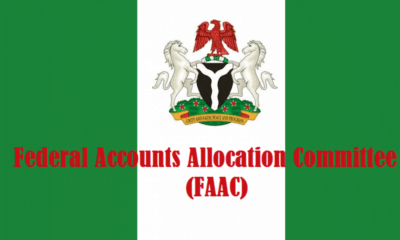The gross monthly distribution by the Federation Account Allocation Committee (FAAC) to the three tiers of government and public agencies amounted to N739.97bn (USD1.8bn) in October (from September revenue). This shows an increase of 6.2% or N43.1bn from the previous payout.
Based on data in the local media, we learnt that petroleum profit tax (PPT), oil and gas royalties and excise duty recorded increases while companies’ income tax (CIT), value added tax (VAT) and import duty recorded decreases over the previous month. State governments received a total of N220.3bn, including N53.8bn representing the 13% derivation for the few oil producing states.
The headline figure is made up of N577.8bn in gross statutory distribution, N159.1bn from the VAT Pool, and N3.1bn of exchange gain. From the distribution, N126.3bn was consumed by a combination of costs, transfers and unspecified refunds.
The committee put the balance in the Excess Crude Account (ECA) at USD60.9m. According to the Nigerian National Petroleum Commission (NNPC), it has in recent months made deductions from its contributions to the federation. The corporation deducted N149.3bn in October, N215.3bn in September, N170.4bn in August, N114.3bn in July, and about N126bn in June from its FAAC remittance. However, zero contributions were made in April.
Based on news from local media, we note that the first FAAC meeting in October was inconclusive as states and local governments resisted the commencement of deductions in relation to the USD418m judgement debt for consultancy services with regard to the Paris Club Loans refund.
We understand that the consultants that assisted with recovering the refund claimed a percentage of the refund as payment for services rendered to the states and local government councils.
Turning to the latest data on internally generated revenue (IGR) from the National Bureau of Statistics (NBS), we note that the total IGR for H1 ’21 stood at N849.1bn compared with N612.9bn recorded in the corresponding period in 2020. Lagos recorded the highest IGR amounting to N267.2bn followed by FCT (N69.1bn), Rivers (N57.3bn), and Ogun state (N54.8bn). While Yobe (N4.0bn), Taraba (N4.8bn), and Gombe state (N5.4bn) recorded the least IGR.
Pay-as-you-earn (PAYE) recorded the highest contribution to the total IGR amounting to N488.1bn while road taxes contributed the least (N16.8bn). The data also revealed that based on zones, South-West zone recorded the highest
revenue amounting to N385.4bn followed by South-South zone (N156.2bn), while NorthEast zone recorded the least (N42.9bn).
According to the Debt Management Office (DMO), the total debt stock for states and FCT as at 30 Jun ’21 stood at N5.99trn (USD14.5bn). A further breakdown showed that the domestic debt stock for states and FCT totalled N4.1trn (USD9.9bn). Lagos (N533.8bn), Akwa Ibom (N242.3bn), and Rivers (N213.2bn) recorded the highest domestic debt stock, while Jigawa (N32.6bn), Ebonyi (N43.4bn), and FCT (N52.7bn) recorded the least.
The external debt stock for states and FCT totalled N1.9trn (USD4.6bn) in the same period. Excluding the need to avoid overdependency on FAAC distributions, boosting IGR will avail state governments the opportunity to pursue profitable capital programmes. Furthermore, the deployment of public-private partnerships in various sectors such as agriculture, health, education, among others, could maximise revenue-generating opportunities state governments.



 Forex3 weeks ago
Forex3 weeks ago




 Naira2 weeks ago
Naira2 weeks ago
 Billionaire Watch2 weeks ago
Billionaire Watch2 weeks ago






 Naira3 weeks ago
Naira3 weeks ago






 Naira2 weeks ago
Naira2 weeks ago


 Naira1 week ago
Naira1 week ago




 Naira4 weeks ago
Naira4 weeks ago






 Naira1 week ago
Naira1 week ago












